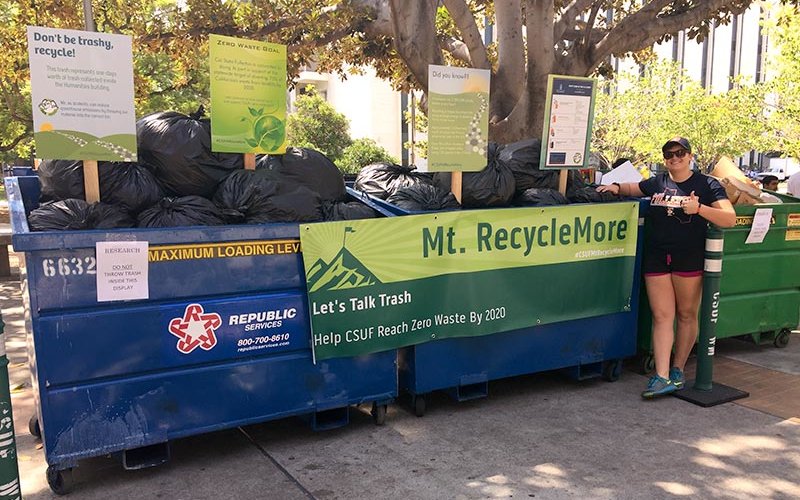
By the time Maelynn Dickson sits down to write her master’s thesis, she will have completed more than 10 dumpster audits to assess waste diversion behaviors at Cal State Fullerton.
The geography student’s research, “Promoting Successful Campus-wide Sustainability Through Hands-on Education,” collects data on recyclable materials from the Humanities-Social Sciences Building that end up in the University’s dumpsters before intervention, after the installation of instructional recycling signs, and after hands-on, community education.
The community education — which Dickson hypothesizes will yield the greatest increase in correct sorting of recyclable materials — includes a YouTube video distributed to students, faculty and staff, and a “Mount RecycleMore” display of dumpsters representing one’s day worth of trash from inside the building.
Dickson hopes the display, presented this week in front of the Humanities-Social Sciences Building, “shows students, faculty and staff how much trash is accumulating in the building and inspires them to pay attention to what they’re throwing away.”
She plans to present her findings and recommendations to the University’s Facilities Management, which is working toward a statewide goal of 75 percent waste diversion by 2020.
As an undergraduate student, Dickson also had the opportunity to work with Facilities Management to measure the amount of waste in McCarthy Hall diverted from landfills. She and other students received the top prize when they presented the research at a statewide geography conference.
Continuing her high-impact learning experiences as a graduate student, Dickson had the opportunity to travel to Alaska over the summer to teach teens the importance of trail work and conservation.
“I can tell you from a student experience that it’s way better to learn something hands on than to just be told how to do something,” she says. “I definitely recommend that all students get involved on campus. Stay an extra hour — whether it’s going to a club meeting or asking your teacher if they need help with research — because it just might turn out to be your master’s thesis.”
Looking to the future, Dickson aspires to work with an organization that betters the planet and preserves earth’s ecosystems.
“I want to teach people about our natural resources, how much we have left and how to conserve them,” she says. “Right now, you can turn on your sink and you’ll find water, and you can go to the gas station and find gas. I want people to be aware that if we continue living how we’re living, one day that might not be possible.
“Take the extra 10-15 seconds to walk to the correct bin, or to look at a recycling sign to figure out what goes where,” she says. “Every step we take, everything we throw away, everything we do in life really does make a difference.”
Upcoming event: Dickson will present a recycling education booth Sept. 28 in front of the Humanities-Social Sciences Building.